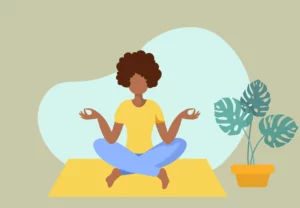With the rapid growth of technology, mental health care is more accessible than ever. As the hustle and bustle of modern-day India continues to test our emotional limits, many are seeking solace in online therapy, a modality that provides flexibility, anonymity, and, in some cases, a cost-effective solution. Recognizing the widespread challenges of anxiety faced by many individuals, this article delves into the world of free online therapy for anxiety. We understand that taking the first step can be daunting, so we’ve curated a list of trusted platforms and resources to guide you on your journey to mental well-being.
Contents
Is Free Online Therapy For Anxiety Available?
 Yes, free online therapy for anxiety is available through various platforms and resources. Numerous websites, applications, and non-profit organizations offer complimentary services ranging from chatbots and self-help modules to peer support communities. These free resources can be particularly beneficial for individuals who might not have immediate access to traditional therapy or those looking for a cost-effective starting point to address their anxiety.
Yes, free online therapy for anxiety is available through various platforms and resources. Numerous websites, applications, and non-profit organizations offer complimentary services ranging from chatbots and self-help modules to peer support communities. These free resources can be particularly beneficial for individuals who might not have immediate access to traditional therapy or those looking for a cost-effective starting point to address their anxiety.
However, it’s essential to note that while these free online resources can provide valuable support and tools, they may not replace the expertise and personalized care that a licensed therapist offers. For individuals with severe or persistent anxiety, it’s recommended to seek professional guidance, either online or in-person, to ensure comprehensive care and support.
Examples Of Free Online Therapy Resources And Platforms
Sure, here are some examples of resources and platforms for free online therapy for anxiety:
TherapyMantra
Specifically tailored for the Indian demographic, TherapyMantra is a comprehensive platform offering a myriad of mental health resources. Users can access articles that discuss various psychological issues, engage in self-assessment tools to gauge their mental well-being and participate in informative webinars. While the platform offers premium services, the vast collection of free resources is invaluable for individuals seeking guidance.
MantraCare
Addressing mental health needs, MantraCare stands out for its culturally sensitive approach to therapy. Recognizing the unique challenges faced by individuals within this demographic, the platform provides a blend of free resources and premium therapy services. The emphasis is on ensuring that users receive care that respects and understands their cultural background.
7 Cups of Tea
This unique platform operates on the principle of active listening. 7 Cups connects users with trained volunteer listeners who offer empathetic support in real time. While the service focuses on providing a non-judgmental ear rather than professional therapeutic advice, for many, the opportunity to vent and communicate can be therapeutic in itself. For those seeking more structured counseling, 7 Cups also presents an option to connect with licensed therapists for a fee.
TalkSpace
A heavyweight in the world of online therapy, TalkSpace primarily offers paid services where users can communicate with professional therapists. However, their commitment to mental health advocacy often sees them providing free resources and tools, particularly during periods of public health or societal crises. These resources can range from articles on coping mechanisms to open community discussions.
BetterHelp
As one of the most well-known online therapy platforms globally, BetterHelp primarily operates on a paid model. However, its dedication to promoting mental well-being ensures that it regularly churns out free articles, tips, and self-help tools that users can access to gain insights into various psychological aspects.
ChatGPT
Platforms like ChatGPT represent the intersection of technology and mental wellness. Although not a replacement for human interaction, such conversational AI tools can provide an outlet for individuals to express their feelings, seek information, or simply engage in a chat. The anonymous and instant nature of this interaction can be beneficial for those hesitant to seek traditional therapy.
YourDOST
Addressing emotional wellness, YourDOST offers a platform for anonymous conversations with trained listeners. For many, the first step towards addressing mental health concerns is discussing them without fear of judgment. The platform also offers the option for paid sessions with professional experts for more in-depth counseling.
Mindfulness and Meditation Apps
Recognizing the therapeutic potential of mindfulness and meditation, apps like Insight Timer, Smiling Mind, and Simple Habit have surged in popularity. Offering free guided meditations, breathing exercises, and mindfulness practices, these apps can serve as an effective tool for anxiety and stress management.
Mental Health Forums and Communities
The internet has birthed numerous communities where individuals can share their mental health journeys, seek advice, or simply find solace in reading others’ experiences. Platforms like Psych Central Forums and the r/Anxiety community on Reddit exemplify this trend. Such spaces offer a sense of camaraderie and understanding, often helping individuals realize they aren’t alone in their struggles.
While these resources offer significant support, they often complement professional therapy rather than replace it. It’s essential for individuals to assess their needs and, if necessary, seek out more intensive professional care.
Benefits Of Free Online Therapy For Anxiety
 Free online therapy for anxiety offers several benefits:
Free online therapy for anxiety offers several benefits:
- Accessibility
One of the primary advantages of online therapy is that it breaks down geographical barriers. Those in remote or underserved areas can access care without needing to commute. This is particularly beneficial for people in regions where mental health services are scarce or non-existent.
- Cost-Effective
By definition, free online therapy doesn’t strain personal finances, making it a great option for those who might not otherwise be able to afford traditional therapy.
- Anonymity
Many free online platforms allow users to engage without revealing their identity, reducing the stigma or embarrassment some might feel when seeking help for mental health issues.
- Flexibility
Online therapy can often be accessed at any time, offering flexibility that traditional therapy might not. This is particularly beneficial for individuals with irregular schedules.
- Comfort
Being able to engage in therapy from the comfort of one’s home can make individuals feel more at ease, potentially making them more open during sessions.
- Adaptability to Modern Lifestyle
As many activities shift online, including work and social interactions, online therapy aligns well with the modern digital lifestyle.
- Reduces Potential Triggers
For some, leaving the house or facing social situations can be anxiety-inducing. Online therapy eliminates the need for such interactions, ensuring the individual doesn’t face additional stress.
- Diverse Modalities
Free online therapy isn’t limited to just text. Many platforms offer chatbots, video sessions, audio messages, and interactive modules, catering to different preferences and needs.
While free online therapy has numerous benefits, it’s crucial to recognize its limitations too. It might not be suitable for everyone, especially those with severe or complex issues.
Tips for Maximizing Your Online Therapy Experience
Maximizing your online therapy experience requires a proactive approach and a conducive environment. Here are some tips to ensure you get the most out of your sessions:
- Choose the Right Platform/Therapist: Research various platforms to find one that aligns with your needs and preferences. Once you select a platform, spend time finding a therapist whose approach and expertise resonate with you.
- Dedicated Space: Create a quiet, private space for your sessions. This should be a place where you feel safe and won’t be disturbed. Comfortable seating, good lighting, and a stable table for your device can make a difference.
- Reliable Technology: Ensure that you have a stable internet connection, a functioning camera, and clear audio. Test your setup before the session to avoid technical difficulties.
- Commit to the Process: Just like in-person therapy, consistency is key. Attend sessions regularly, complete any assigned tasks, and be engaged in the process.
- Open Communication: Be honest with your therapist about your feelings, concerns, and any issues that arise during the therapy process. Feedback is crucial for adjusting and improving the therapeutic experience.
- Set Boundaries: Establish clear boundaries for when you’re “in session.” This can mean turning off notifications, letting family members or housemates know not to disturb you, and committing to the designated time as ‘therapy time’.
- Engage in Self-Care: Therapy can be emotionally draining. After each session, give yourself some time to process and relax. This might mean practicing deep breathing, journaling, or engaging in a comforting activity.
- Reflect and Review: Periodically review your therapy journey. Celebrate the progress you’ve made, identify areas that need more attention, and discuss any adjustments with your therapist.
By actively engaging in the process and ensuring you have the right environment and mindset, you can make your online therapy experience as beneficial as possible.
What Are Some Other Additional Resources To Relieve Anxiety?
 Certainly, there are a plethora of resources available that can aid in relieving anxiety. Here’s a list:
Certainly, there are a plethora of resources available that can aid in relieving anxiety. Here’s a list:
1. Books
- The Anxiety and Phobia Workbook by Edmund J. Bourne
- Dare: The New Way to End Anxiety and Stop Panic Attacks by Barry McDonagh
- Feeling Good: The New Mood Therapy by David D. Burns
2. Mindfulness and Meditation Apps
- TherapyMantra: Offers guided meditations aimed at reducing stress and anxiety.
- Calm: Features mindfulness exercises, breathing techniques, and sleep stories.
- Insight Timer: A vast library of free meditations targeting various issues, including anxiety.
3. Breathing and Relaxation Techniques
- Box Breathing: A method involving deep, rhythmic breathing to calm the nervous system.
- Progressive Muscle Relaxation: A technique where muscles are tensed and then relaxed to alleviate tension.
4. Yoga and Physical Exercise
Physical activity, especially yoga, can have profound benefits for reducing anxiety. Platforms like YouTube have many free yoga sessions tailored for anxiety relief.
5. Support Groups
Platforms like Anxiety UK and the Anxiety and Depression Association of America (ADAA) offer online forums and support groups where individuals can share their experiences and coping techniques.
6. Journaling
Writing down your feelings and fears can help process emotions, making it easier to understand and manage anxiety.
7. Herbal Teas and Supplements
Certain herbs, like chamomile, lavender, and valerian root, have been shown to have calming effects. However, always consult with a healthcare professional before adding any new supplements to your regimen.
While all these resources can be beneficial, it’s crucial to remember that what works for one person might not work for another. It’s a process of exploration, trial, and adjustment to find what suits you best. And if anxiety becomes overwhelming or debilitating, it’s essential to seek professional help.
Conclusion
In the digital age, the rise of free online therapy offers a beacon of hope for those grappling with anxiety. Harnessing the power of technology, these platforms break down barriers, offering solace, understanding, and tools for better mental well-being. While they present a myriad of advantages, from accessibility to cost-effectiveness, it’s crucial to approach them with discernment, ensuring they align with individual needs.
Amidst all the tools, the most potent remains our intrinsic desire for healing and growth. Embracing these resources is just the first step in a journey toward a calmer, more centered self. If you are experiencing anxiety-related issues, Online Anxiety Counseling at TherapyMantra can help: Book a trial Online therapy session


